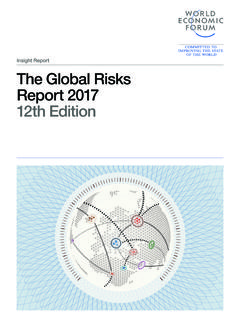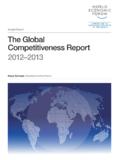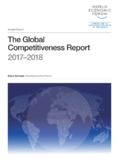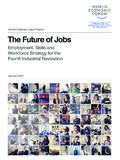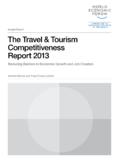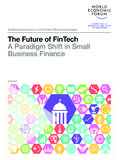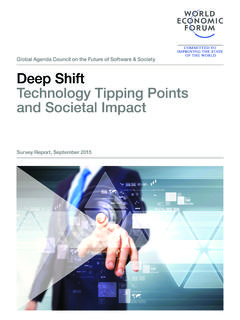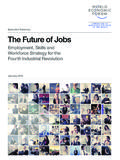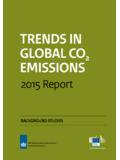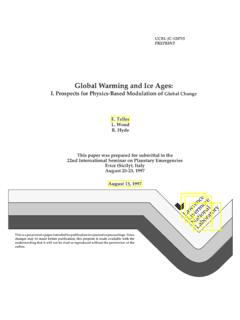Transcription of Industry Agenda Environmental Sustainability Principles ...
1 Industry AgendaEnvironmental Sustainability Principles for the Real Estate IndustryJanuary 2016 World Economic Forum Industry Agenda Council on the Future of Real Estate & Urbanization World Economic Forum91-93 route de la CapiteCH-1223 Cologny/GenevaSwitzerlandTel.: +41 (0)22 869 1212 Fax: +41 (0)22 786 2744 Email: World Economic Forum 2016 All rights reserved. No part of this publication may be reproduced orTransmitted in any form or by any means, includingPhotocopying and recording, or by any informationStorage and retrieval system. REF1201163 Environmental Sustainability Principles for the Real Estate IndustryContentsForeword by the Industry Agenda Council3 Foreword5 Introduction6 Real Estate and the Environment9 A Survey of Existing Practice12 Sustainable Solutions for Real Estate13 Environmental Sustainability : The Business Case15 Towards a More Sustainable Real Estate Sector16 Appendix I: Examples of Environmental Initiatives in the Built Environment22 Appendix II: Principles and Implementation Assessment ToolsThe World Economic Forum aims to develop a common set of Environmental Principles in partnership with the real estate Industry .
2 The goal of this effort is to ensure that the decision-making and operations of real estate firms place a high priority on becoming environmentally sustainable. Although there are a growing number of diverse Environmental standards at the building level, at the company level as well as at the urban and national governmental level, the real estate Industry lacks a uniform set of Sustainability Principles . Current initiatives often lack a wider context, a value proposition and a broader vision. In addition, there is fragmentation and confusion and a widespread belief that real estate lags behind other sectors in responding to Environmental challenges. The Forum recommends that real estate Industry leaders commit to a set of Sustainability Principles and create a community around the diligent adoption of specific initiatives that serve these Principles . This represents an opportunity to demonstrate leadership and to shape the Agenda , rather than merely responding to regulatory and other external pressures.
3 The goal is to embody a wider sense of stewardship for the natural environment, consistent with the ethical and professional conduct of business. Moreover, a clear business and economic rationale for embedding Environmental Sustainability in firm-wide decisions, policies and strategies can result in long-term cost reduction, protected or even enhanced property values and, hence, improved risk-adjusted returns. There are opportunities to embrace new technology and innovation to meet Environmental goals and enhance business performance. The real estate sector should further ensure that all assets contribute to city-wide resilience efforts to minimize the impact of extreme weather events and to speed recovery. Activities should align with city-wide efforts to meet such goals. In particular, we recommend that corporate leadership focus on the following Sustainability efforts as part of a commitment from the sector to contribute to meeting sustainable development goals and to the Agenda set out in the agreements reached at the United Nations climate change summit in Paris in December 2015.
4 These include reducing greenhouse gas emissions, implementing water/waste management, and reducing pollutants in the air, water and land. To access the full report Sustainability Principles for the Real Estate Industry , please go to: Sustainability Principles for the Real Estate IndustryEnvironmental Sustainability Principles for the real estate industryAcross the lifecycle of individual portfolios and as key business objectives, and as organizations committed to environmentally sustainable practices for the built environment, we will: 1. Embed adherence to best-in-class Sustainability standards in all aspects of our real estate operations, with board level responsibility for monitoring and disclosing our Sustainability performance. 2. Ensure that our decisions contribute to improvements in Environmental Sustainability at the local and urban levels, working cooperatively with tenants, city governments, planners and other stakeholders in achieving our targets. 3. Commit to continuous improvement in the Environmental performance of construction and development activities, our real estate operations and our asset management policies.
5 4. Track the Environmental performance of our real estate assets and operations on a continuous basis, to assess our ecological footprint, and our exposure to risk from natural shocks, Environmental regulation and the economic impacts of climate Identify explicit targets for improving our Environmental Sustainability performance including specifically in our commitment to minimize emissions of greenhouse gases and to increasing our use of renewable Sustainability Principles for the Real Estate IndustryIntroductionThis report has been produced by the World Economic Forum s Industry Agenda Council on the Future of Real Estate & Urbanization, which brought together a wide range of representatives from the real estate Industry , as well as city governments and academia all united in a common interest in the real estate Industry and concern about the impacts of climate change and the environment on the future development of cities and the built environment. Real estate is central to urban development, consumes physical resources and is a significant source of emissions.
6 Equally, it is central to the goal of creating an environmentally sustainable future. We recognize the imperative to avoid dangerous climate change by limiting global average temperature rise to less than 2 C, and understand that the existing trend of the world s net greenhouse gas (GHG) emissions is not consistent with this ambition. We also acknowledge that the real estate sector is responsible for more than 20% of the world s carbon emissions and for other Environmental impacts, including waste production, pollution, use of water and consumption of other natural the past few years, many companies in the sector have taken action to reduce the Environmental impact of buildings. We will continue in our efforts to help support sustainable development. We will also play a part in lowering the current global emissions trajectory, supporting adaptation to climate change in cities, reducing pollution and damage to the natural environment, and promoting the Principles of the circular economy where possible.
7 We stand ready to work with our stakeholders to implement the UN Sustainable Development Goals and we will tailor our approach to local this report we first set out as context the contribution of real estate to Environmental issues and Sustainability . By many metrics, the sector is a major contributor to global emissions and user of non-renewable resources. Despite substantial progress, for example with the growth of green building technologies, the sector lags behind other industries in responding to Environmental challenges. Next we survey evidence on the response of real estate organizations to the adoption of Sustainability Principles . While many firms have Sustainability statements, these lack coherence and consistency. Many do not appear to be Principles shaping an organization s policies and strategies, but rather are responsive and focus on measurement and reporting. Adopting a clear set of Principles would help the sector to contribute to a more sustainable economy. However, the solutions adopted need to be feasible and valuable and there needs to be a clear business case for making those changes.
8 The fourth and fifth sections of the report focus on these issues. Finally, we set out our conclusions a call for the Industry to adopt a comprehensive and strategic set of Principles to contribute to sustainable development in the built Sustainability Principles for the Real Estate IndustryReal Estate and the EnvironmentThe real estate sector uses more energy than any other sector and is a growing contributor to CO2 emissions. Although measurement is complex, most estimates suggest that the real estate sector is the single most significant sectors in terms of CO2e1 contributions. The sector consumes over 40% of global energy annually 20% of total global greenhouse gas emissions originate from buildings There is a projected 56% increase in building CO2 emissions by 2030 A 7% increase in proportionate share of global GHG emissions is expected by 2030 Buildings use 40% of raw materials globally (3 billion tonnes annually) Buildings also have a significant and growing impact on other Environmental aspects.
9 For example, by 2030 buildings are expected to use 12% of global fresh water, and generate 30% of total waste in the European : Accenture (adapted from IPCC, USBC, EC)Figure 1: Real estate s contribution to energy use and CO2 emissionFigure 2: Environmental impact and contribution of built form Source: JLL from cited materialEnvironmental impactShare of buildings in total output/useRaw material consumption230%Solid waste generation3,425-40%Potable water consumption512%Water effluents620% Global socio-economic forces will make the Environmental impact of real estate sector even more important in the future. By most projections, by 2030, the global population will exceed 8 billion and over 60% of the world s population ( billion people) will be living in urban environments. This will lead to significant growth in the construction and real estate market: Global construction output will reach $ trillion ( CAGR) by 2030 Investable real estate will reach US$69 trillion (60% growth from 2015)The largest 750 cities (representing 61% of global GDP) will require: 260 million new homes 540 million m2 of new office space 60 million new jobs in Industry Parties to the UN Climate Change Conference (COP21), which took place in Paris, France, in December 2015, agreed to a deal to keep global warming below 2 C and, ideally within C.
10 To stay under the 2 C threshold, the real estate sector requires more stringent targets. According to World Bank estimates, a 36% reduction in total CO2 emissions in the real estate sector is required by 2030 in order to stay within the 2 C threshold. This translates into a reduction in annual energy consumption and a 3% reduction in annual emissions. The goal of achieving carbon neutrality by 2050 will require new non-CO2 emitting energy for the built environment. 7 Environmental Sustainability Principles for the Real Estate IndustryEnvironmental impactShare of buildings in total output/useRaw material consumption230%Solid waste generation3,425-40%Potable water consumption512%Water effluents620% Progress made: Green buildingsIt would be wrong to suggest that the real estate Industry has not acknowledged Environmental Sustainability in its decision-making. In development, there has been a significant shift towards the production of more environmentally sustainable buildings. Currently, 40-48% of new commercial builds are green , compared to only 2% in 2005.
